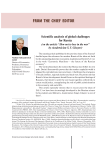Economic and Social Changes: Facts, Trends, Forecast @volnc-esc-en
Статьи журнала - Economic and Social Changes: Facts, Trends, Forecast
Все статьи: 1763
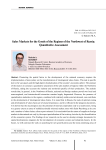
Sales markets for the goods of the regions of the northwest of Russia: quantitative assessment
Статья научная
Promoting the spatial factor in the development of the national economy requires the implementation of state policy on the transformation of interregional value chains. This task is specific due to the vast spaces and the high degree of polarization of the country’s economic sphere. The purpose of the study is to conduct a quantitative assessment of the sales markets of regions within the Northwest of Russia, taking into account the industry and territorial specifics of their production. The analysis reveals that, in general, in the Northwest of Russia, national and foreign markets prevail over local and macroregional, and interterritorial interaction remains largely fragmented. However, the presence of specialization industries in the regions, combined with relatively stable external demand, can contribute to the development of interregional value chains. It is noted that in Russia, the tasks of optimal zoning and development of value chains are of crucial importance, and it is reflected in the program documents. It is shown that the macroregion uses the potential of internal cooperation only to a small extent, being to a greater extent an array of multidirectionally oriented market zones with Saint Petersburg as its core and a number of value chains, often export-oriented. It is concluded that the nature of supplies to foreign markets is determined not only by the export specialization of the territory, but also by the diversification of the economic system. The findings of our research can be used to develop strategic documents for spatial development, programs for the development of economic sectors and industrial clusters. In the future, we will continue the work on searching for new growth points and the most promising areas of structural changes for the transition of regions and the country as a whole to sustainable socio-economic development.
Бесплатно

Satisfaction with the work-life balance: working women's view (regional aspect)
Статья научная
One of the employee’s objective needs is an appropriate balance between work and private life. The article presents a comparative study of satisfaction with the work-life balance among working women with and without children. Based on the materials of a questionnaire survey of the Vologda Oblast workingage population, conducted in 2018, we investigate the features of perception of the following aspects of work and family life: satisfaction with the ability to combine work and family responsibilities, the impact of work on various aspects of daily life, the ability to organize recreation, the presence of problems related to one’s close environment, qualitative characteristics of work. We have revealed that working women with and without children have predominant positive or neutral impact of work on daily life, and there are no significant differences in the number of working days per month and the actual length of the working day. We have found that women without children often perform extra work, are less able to organize their leisure time, and are harsher in relation to their close environment. However, there are no significant differences in satisfaction with the work-life balance among women with and without children. The paper determines that working women (regardless of parental status) who satisfactorily assess the ability to combine work and family responsibilities are characterized by better indicators of labor activity (fewer delays and disruptions in work, less failure to fulfill plans, etc.), a higher level of realization of physical, personal and professional abilities in work. The similarity of the subjective perception of the work-life balance among working women with and without children may indicate women’s high adaptability to multitasking and time allocation. We highlight the importance of improving the policy on family and employment, in particular in terms of developing flexible employment formats.
Бесплатно
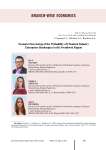
Статья научная
The relevance of the study is due to the increasing risks of bankruptcy of chemical industry enterprises in the context of global socio-economic instability. The aim of the work is to design forecast scenarios for the dynamics of the probability of chemical industry enterprises bankruptcy, taking into account the influence of internal and external factors. The paper uses a methodological approach to forecasting the probability of enterprises bankruptcy, which combines discriminant analysis according to the modified Altman method, multiple least squares regression analysis, assessing the impact of internal and external factors on the probability of enterprises bankruptcy, as well as autoregressive modeling with a moving average (ARIMA/ARMA) to build forecast scenarios (inertial, extremely pessimistic and optimistic) for the probability of bankruptcy. The study uses data from the primary reporting of chemical industry enterprises in the Sverdlovsk Region for the period from 1999 to 2023 and statistical data from Rosstat. The study has found that large and small chemical enterprises are more susceptible to bankruptcy risks than midsize ones due to high creditworthiness, insufficient amount of stock and own working capital. We identify main factors influencing the probability of bankruptcy for each group of chemical industry enterprises: for large enterprises, it is the provision of own working capital, profitability of non-current assets, number of economically active population in the Sverdlovsk Region, amount of costs for innovative activities of organizations in the region; for midsize enterprises, it is the provision of total capital and profitability of current assets; for small enterprises, it is the provision of own working capital and inventory turnover. The projected scenario forecasts allow us to establish a low probability of bankruptcy for midsize chemical enterprises, an increased probability for large enterprises and a significant probability for small enterprises. Our approach to scenario modeling and forecasting the probability of bankruptcy, taking into account the influence of various factors, tested on the example of chemical enterprises, can be used to develop strategic plans and measures of state support for industry enterprises aimed at reducing the risks of financial insolvency and increasing their financial stability.
Бесплатно
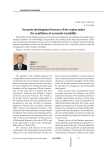
Scenario development forecast of the region under the conditions of economic instability
Статья научная
The problem of the reliable prognoses of economical development is mainframe for making up any strategic document. No methodology can guarantee clear indexes of the long-rang dynamics. Under such circumstances the proper way out can be creating of the alternative scenarios, characterizing the threshold possibilities of the event development. Such point of view is especially relevant under the circumstances of the economic instability.
Бесплатно
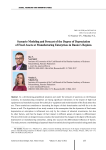
Статья научная
In a deteriorating geopolitical situation and under the pressure of sanctions on the Russian economy, its manufacturing enterprises are facing significant restrictions in the import of high-tech equipment and materials necessary for technical re-equipment and modernization of the fixed assets they use. These restrictions contribute to increasing the degree of their deterioration and will do so in the future as well. The hypothesis of our study consists in the assumption that the dynamics of fixed assets depreciation at enterprises is influenced not only by the volume of attracted investments, but also by other factors, and that the degree of their impact in different groups of regions is differentiated. The aim of the work is to design forecast scenarios that would show the changes in the degree of fixed assets depreciation at manufacturing enterprises, taking into account the differentiated influence of factors. The study presents a methodological approach based on statistical and regression analysis using panel data and autoregressive integrated moving average (ARIMA) model to identify factors affecting the dynamics of fixed assets depreciation at manufacturing enterprises in various regions and design a system of forecast scenarios for its changes in the future. We group the regions according to the degree of depreciation of fixed assets of manufacturing enterprises (we identify groups of regions with an extremely high level of fixed assets depreciation, and the levels above and below the Russian average). Using regression models we identify the differentiated influence of factors on the dynamics of fixed assets depreciation: in the first and third groups of regions, the key factor in increasing depreciation is the difficult financial situation of enterprises; in the second group - insufficient volume of attracted investments in fixed assets. For each group of regions, autoregressive modeling of the dynamics of these factors is carried out using a moving average to form the most likely forecast scenarios for changes in the degree of fixed assets depreciation at manufacturing enterprises until 2024. As a result of forecasting, we identify regions with the most likely dynamics of further increase in the degree of depreciation of fixed assets of enterprises; these regions should become a priority in obtaining state support for the implementation of industrial policy in Russia.
Бесплатно
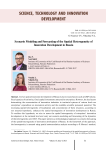
Scenario modeling and forecasting of the spatial heterogeneity of innovation development in Russia
Статья научная
Uneven spatial innovation development of Russia is due to many factors such as GRP volume, fiscal capacity of territories, fixed capital investments attracted by enterprises. However, the key factors determining the concentration of innovation industries in territorial systems of various levels are enterprises’ expenditure on innovation activity and the available scientific personnel potential. The increasing spatial heterogeneity of localization and concentration of these resources, according to our research hypothesis, enhances the spatial heterogeneity of innovation development in Russia. To confirm this hypothesis, we aim to assess the spatial heterogeneity of enterprises’ innovation development at the national level and carry out scenario modeling and forecasting of the dynamics of this heterogeneity until 2025. The paper presents a methodological approach to scenario forecasting of the spatial heterogeneity of innovation development of Russia. In the framework of the approach, the heterogeneity is assessed using spatial autocorrelation analysis according to P. Moran’s method, regression analysis of the dependence of the volume of shipped innovation goods and services performed on the costs of innovation activities carried out by enterprises, and the number of research personnel in the regions, as well as autoregressive analysis of the dynamics of their changes using a moving average (ARIMA modeling) to form the most likely forecast scenarios of innovation development for different groups of regions. The novelty of the approach lies in the system-wide use of spatial autocorrelation analysis methods based on various spatial weight matrices, regression analysis methods based on panel data and ARIMA modeling, which in combination with each other make it possible to determine the degree of influence of the factors on the heterogeneity of innovation development in regions and to form a system of various forecast scenarios. The results of the study will serve as the basis for the formation of Russia’s innovation framework. The constructed forecast scenarios will help to form strategies for innovation development in Russian regions, taking into account the identified features of the spatial localization of factors that have a significant impact on innovation development.
Бесплатно
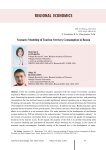
Scenario modeling of tourism services consumption in Russia
Статья научная
Given the unstable geopolitical situation associated with the impact of economic sanctions imposed by Western countries, it is extremely important for Russia to ensure its own steady development pace. Saturating the domestic market with Russian-made high-quality goods and services, and promoting consumption that has declined because people significantly reduced spending due to rising prices, are becoming relevant goals. The task of stimulating domestic consumer demand determines the framework of development of the Russian economy in the near future. To address the issue, Russia possesses a great potential for the formation of new growth points. One of them is tourism, whose high multiplicative effect allows us to consider it as an economic driver. The main priorities for the development of the Russian tourism industry by 2030 are reflected in the national project “Tourism and the hospitality industry”. In the context of economic uncertainty, there is an increasing need to improve the quality of management decisions in the tourism sector. In this regard, the purpose of the work is to develop forecasting tools for scenario modeling and assessment of economic effects obtained due to changes in the volume of domestic tourist consumption. Scientific novelty of the research lies in the development of input-output modeling methodology to determine the economic effects provided by the growth of demand for domestic tourism services. The results of the study have shown that active development of tourism under the optimistic scenario will provide an almost twofold increase in the volume of gross output annually in comparison with the existing rates of tourist services consumption. We use general scientific methods of analysis, synthesis, comparison, generalization, and tools based on input-output methodology. The information base includes the works of domestic and foreign scientists involved in stimulating domestic tourist consumption, scenario modeling and forecasting of the economy, as well as information from state statistics bodies and World Bank data.
Бесплатно
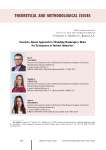
Scenario-based approach to modeling bankruptcy risks for enterprises in various industries
Статья научная
The deterioration of the financial situation of enterprises in various industries, which is currently observed in many regions, creates prospects for reducing their financial stability and the emergence of bankruptcy risks. It is necessary to develop existing methodological approaches so as to assess and forecast the risks of bankruptcy for industries as a whole, rather than for individual enterprises, and form effective state support mechanisms for them. The main goal of our research is to develop these approaches. The novelty of the presented approach consists in the following facts: we develop an algorithm for scenario modeling and forecasting the risks of bankruptcy for industries, including an assessment of the financial stability of the industries under consideration and the probability of bankruptcy; we design regression models showing the dependence of change in the probability of bankruptcy on a whole system of internal and external factors; we conduct autoregressive modeling of the dynamics of internal and external factors using a moving average (ARMA). Autoregressive modeling allows us to form the most probable, inertial forecast scenario for the next five years taking into account the preservation of the noted trends and the corridor of maximum possible values. The forecast values of the dynamics of these factors and the constructed regression models serve as a basis for designing forecast scenarios for changes in the probability of bankruptcy of large, medium and small machine-building enterprises in the Sverdlovsk Region. As a result, we reveal that major machine-building holdings of the Sverdlovsk Region that do not have sufficient working capital, have a low level of solvency, and experience a significant debt burden are most susceptible to bankruptcy risks. In order to increase financial stability and effective development of large machine-building enterprises, government support is required.
Бесплатно
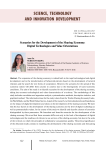
Scenarios for the development of the sharing economy: digital technologies and value orientations
Статья научная
The expansion of the sharing economy is related both to the rapid technological and digital development and to the transformation of behavioral patterns based on the development of network relations and the search for new forms of cooperation. However, the scenarios for the spread of this economic system will differ from country to country due to the heterogeneity of socio-economic conditions. The aim of the study is to identify scenarios for the development of the sharing economy, taking into account technological and value characteristics of a territory. The methodology of this study includes correlation and regression analysis, systematization methods, descriptive statistics, and graphical method. The information base for the study is data from the Timbro Sharing Economy Index, the World Bank, and the World Values Survey. As part of the research, we formulated and tested hypotheses on the impact of digital development and values on the development of the sharing economy. We show that the key factors in the development of the sharing economy are the level of digital technology as well as postmaterialist values. In the course of the study we identify and describe clusters of countries distinguished by these parameters. We formulate and describe scenarios for the development of the sharing economy. We reveal that these scenarios differ not only in the level of development of digital technologies and the readiness of citizens to use services of the sharing economy, but also in the scale of the territory to which the principle of collaborative consumption applies. Theoretical significance of the obtained results consists in modeling the development of the sharing economy and forecasting possible directions of its development. Practical significance is the application of these scenarios in the formation of urban infrastructure or the design of smart cities.
Бесплатно
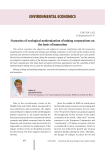
Scenarios of ecological modernization of mining corporations on the basis of innovation
Статья научная
The article considers the objective and subjective reasons interfering with the innovative modernization of the mining and mining and smelting companies on the basis of the analysis of the external and internal environment of the Russian mining corporations, during the post crisis period. On the basis of theoretical notions about the economic category of “modernization” and the analysis of ecological corporate policy of the mining companies, the scenarios of ecological modernization of the basic manufacture and main funds of nature protection appointment and the condition of their implementation taking into account the specificity of mining manufacture are proved.
Бесплатно
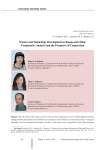
Статья научная
The relevance of the article consists in the fact that taking into account modern global economic changes and the specialization of the Russian economy, it (the economy) is searching for ways to integrate optimally into the international division of labor; at the same time, cooperation with China becomes important. The main idea and goal of the study is to conduct a comparative analysis of science and technology development in Russia and China and to identify prospects for their cooperation in the modern world economy. Scientific novelty of the work consists in the fact that it analyzes the state of international cooperation in science and technology, and this analysis takes into account the overall situation in trade and economic cooperation, and manifestations of science and technology cooperation in trade; besides, the analysis takes into account science and technology cooperation factors such as the place of countries in the global innovative development, the presence of similar national priorities of science and technology development, and similar types of policy documents...
Бесплатно
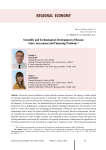
Scientific and technological development of Russia: state assessment and financing problems
Статья научная
Given the current conditions of rapid cyclical economic processes, the urgency of tasks related to ensuring sustainable economic growth is increasing. The available experience clearly indicates that sustainability can only be achieved by ensuring the proper level and pace of scientific and technological development. At the same time, the implementation of spatial development concept is entering into the foreground due to globalization, integration and digital technologies development. The purpose of the work is to assess the scientific and technological development of Russia in the context of international comparisons and to study the system of R&D financing in the country. Based on this purpose, the article considers the evolution of approaches to the scientific and technological development of territories, identifies the need to form a single scientific and technological space in Russia, which will reduce the existing imbalances and ensure the uniformity of regional development; substantiates the significance of the financial subsystem in the formation of a single space; analyzes its state. The conducted analysis has shown that the current system of research and development financing in Russia is contrary to the global trends. The research has revealed that a crucial role in the process of funding is still played by the state; it has demonstrated the low efficiency of the system of R&D financing and offered recommendations for its improving and optimizing, i.e. the formation of regional funds for scientific, scientific-technical and innovation activities; increasing the availability of federal funding sources of scientific and technological development in the regions and the efficiency of venture activity in Russia. Further stages of the research will involve studying other basic subsystems of the scientific and technological space (organizational, managerial, informational, educational, etc.), as well as working out practical recommendations for their development, efficiency and harmonious interaction and functioning.
Бесплатно
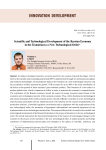
Статья научная
In modern developed countries, an active search for new sources of growth has begun. One of them is the scientific and technological potential (STP), implemented through new informational, digital, and industrial technologies. Its development leads to the formation of a new technological structure and the acceleration of labor productivity growth. STP accounts for up to 90% of the total contribution of all factors to the growth of these countries' gross domestic product. The formation of a new order is a modern global trend, which is important to follow in order to maintain the economy's competitiveness. The orientation of the Russian economy toward the export of energy resources poses threats to the economic and technological security of the national economy. Thus, within fundamental technological and structural changes of the world economic system, the task of Russia's transition to a new technological order becomes particularly relevant. Important areas of its solution are the creation of qualitatively new production relations, a favorable regulatory environment and its alignment with the requirements of the new technological order, the formation of appropriate informational and material equipment for the implementation of new technologies and activities. The purpose of this article is to analyze the scientific and technological development of the Russian Federation in the process of transition to the new technological order. The article summarizes the theoretical foundations of the essence of technological changes in the economy in the process of the transition to the new technological order; it studies domestic and foreign experience of implementing national plans and strategies in the sphere of scientific, technical, and innovative development; it analyzes the status and trends of the scientific and technological development of the Russian Federation according to key indicators of a new technological revolution; it reveals issues of the economic development in the process of the transition to the new technological order; it develops a set of measures for the activization of processes of the scientific and technological development of the Russian Federation in a new environment.
Бесплатно
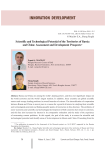
Статья научная
Russia and China are among the world’s leading powers, and they exert significant impact on the world economy and the world’s largest markets. In addition, these countries are global scientific centers and occupy leading positions in several branches of science. The intensification of cooperation between Russia and China in recent years is a reason for a growth of interest in studying their scientific and technological potential and finding possible points of interaction in this direction. The problems of socio-economic and scientific and technological development of both countries have much in common, and this fact also increases the interest in its comparative evaluation and the study of the experience of overcoming current problems. In this regard, the goal of the study is to assess the scientific and technological potential and identify areas of its development in Russia and China. Proceeding from the goal, the article studies theoretical aspects of scientific and technological development of territories and provides our own interpretation of the concept “scientific and technological potential” based on the combined option that unites the resource-based and effective approaches to this economic category...
Бесплатно
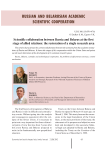
Статья научная
The article characterizes the current collaboration between the scientists from the academic institutions of Russia and Belarus. It shows the stages of this cooperation within the Union State and points out the main directions of the development of its common research space.
Бесплатно
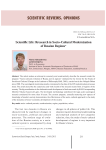
Scientific life: research in socio-cultural modernization of Russian regions
Статья обзорная
The article makes an attempt to concisely and constructively describe the research under the program “Socio-cultural evolution of Russia and its regions” (initiated by the Centre for the Study of Social and Cultural Change at the Institute of Philosophy RAS, 2005), carried out in the Vologda Oblast since 2008. The sociological monitoring results correspond to the data of the RF modernization processes study. The article describes the experience and work results of the research teams from 25 regions of the country. The big contribution to the elaboration and development of tools was made by RAS Corresponding Member Nikolai Ivanovich Lapin. The developed methodology underlined the large-scale sociological research conducted for more than 10 years. The current program, annually mastering new aspects of knowledge of modern society, demonstrates the effectiveness of the socio-cultural approach to the study of the dynamics of socio-economic development of the society.
Бесплатно
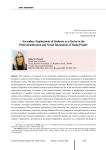
Статья научная
The relevance of research on the secondary employment of students is emphasized by the necessity to study its mixed impact on the professionalization and social integration of young people in the Russian society. The goal of this article is to clarify the meaning of secondary employment for the professionalization and social integration of young people in modern Russia on the basis of empirical data analysis. Originality of the problem statement and its solution are due to the fact that we consider students’ employment motivation in relation to the results achieved, realization of employment expectations, identification of possible outcome from combining studies and work, including the description of studies-work combination results for social and personal development of students and selection of several functions of young people’s secondary employment. Empirical basis of the research is complied from the results of author’s interviews with working students (2011 and 2017). The research showed the hierarchy of students’ secondary employment motives: financial motives are on the top and professional ones are less important. We note relative permanency of this hierarchy and a decrease in importance of the early start of professional carrier for working students. Division of pragmatic and professionally oriented motives of students’ secondary employment is explained. We point out that many working students have implemented their financial expectations, which reveals the leading role of the economic function in students’ employment; devaluation of secondary employment experience as a competitive advantage in social and labor relations; non-productivity of performed work for professionalization of the majority of working students. At the same time, we reveal the significant impact of work on the formation of common labor culture in students. Necessity to strengthen professionalization function within students’ secondary employment is revealed, and practical recommendations are given. The results of this research may help develop theoretical models and accumulate empirical data in the sphere of economic sociology, labor sociology, and youth sociology. It can be used by public authorities, employment services, and vocational education institutions.
Бесплатно
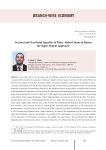
Sectoral and territorial specifics of value-added chains in Russia: the input-output approach
Статья научная
This paper shows the growing role of domestic demand in the development of the modern economy. We consider the capacity of domestic markets of the largest countries of the world. We prove that the low volume of domestic demand inhibits economic dynamics and worsens the quality of socio-economic development of the Russian Federation. We consider that a promising direction for expanding domestic consumer and investment demand is the implementation of state policy to increase the incomes of the population, companies and the state in the framework of lengthening their own value-added chains that produce goods and services for final use. In this regard, the goal of this study is to analyze the existing value-added chains, assess the degree of their fragmentation, sectoral and territorial specifics. The input-output theory serves as a methodological basis for our study. The information source is represented by basic input-output tables and the data of the Unified Interdepartmental Statistical Information System. The novelty of the research consists in adjusting the multidisciplinary approach to the assessment of fragmentation of production to suit the needs of the regional level and in identifying modern patterns in the functioning of Russian value-added chains on the basis of the approbation of the approach on the materials of Russian regions. According to the results of the calculations we reveal the average position of 125 branches of the Russian economy in the supply and sales chains. We substantiate the degree of fragmentation of production chains of various industries; we substantiate the factors that determine the length of a production process. We calculate the average distance along the sales chain, which the goods cover to the moment of their use by the end consumer. We consider regional fragmentation of production in Russia. We reveal a number of statistically significant dependencies between the position of regions in the value-added chains and their socio-economic development performance.
Бесплатно
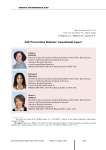
Self-Preservation Behavior: Generational Aspect
Статья научная
The purpose of the research is to identify features of self-preservation behavior in different actual generations of Russians to assess the vector of their transformation and the prospects for life expectancy dynamics. The relevance of the topic is determined by the significant lag between Russia and developed countries in terms of life expectancy, largely due to behavioral factors. The scientific novelty consists in the fact that we can adapt the Strauss-Howe generational theory to study generational characteristics of population behavior related to health. By the results of a sociological survey, we have verified the hypotheses about the nature of self-preservation behavior models of five ten-year-old actual cohorts of the population and the combined generation born before 1955 inclusive. Regarding the ratio of self-preservation behavior models of the two oldest cohorts, the paper does not confirm the formulated hypothesis, which may be due to the positive transformation of health-preservation behavior models as people became older, due to changes in health status, as well as in the population of the older cohorts due to high premature mortality in groups with the most unfavorable lifestyle. Regarding four young actual generations, the study has confirmed the hypotheses showing that favorable socio-economic and demographic conditions, anti-alcohol and anti-smoking measures of the 2000s and promotion of an active healthy lifestyle in general have a positive effect in terms of influencing the nature of self-preservation behavior of young cohorts, which indicates the possibility of influencing behavioral health factors at the stage of its formation. The positive vector of transformation of generational patterns of self-preserving behavior, especially clearly manifested in men, allows us to hope for the restoration and prolongation of the growing dynamics of the life expectancy of Russians with the probability of achieving targets in the future, provided that favorable behavioral patterns in the field of health conservation are consolidated.
Бесплатно

